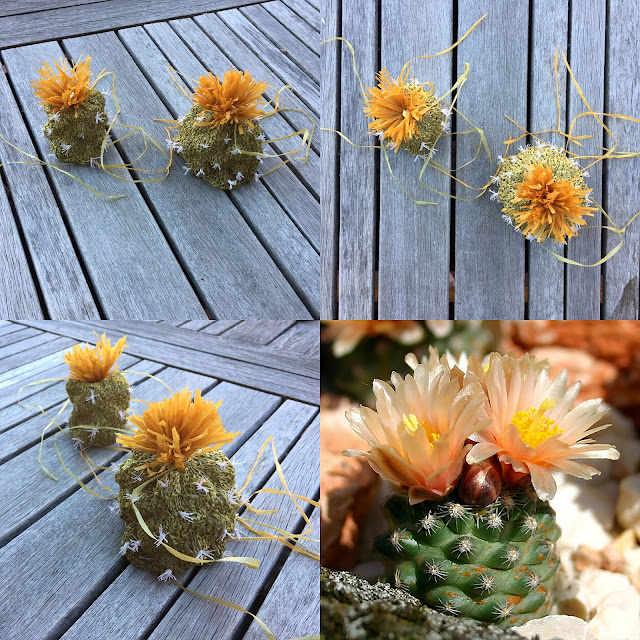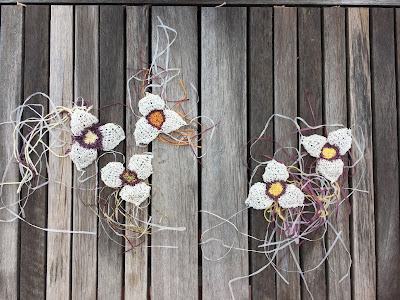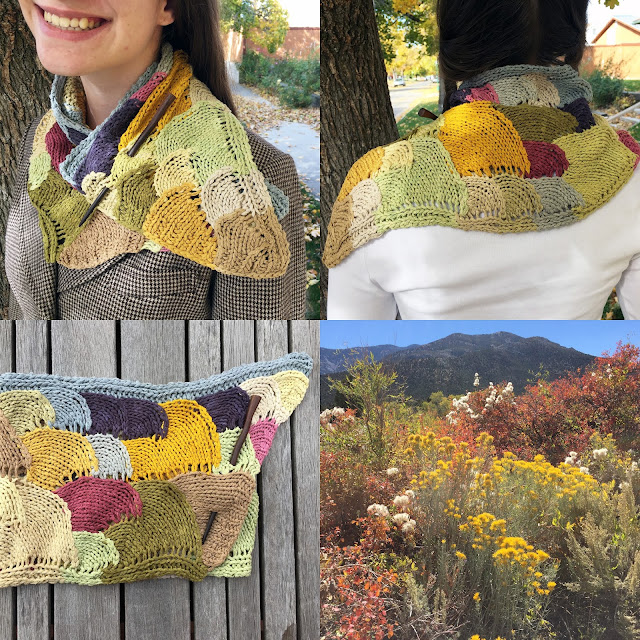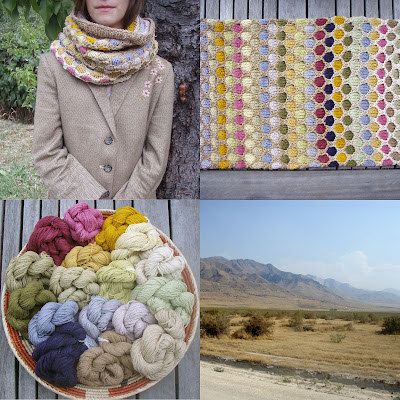Whew! I have been knitting up a storm but it is all holiday
gift knitting that I can’t show you just in case the recipients are looking.
But I also did a little Great Basin knitting in the in-between times. I wanted
to play with a different colorway for the Juniper Tam I made for my residency.
I like the effect of mixing the colors of the berries. I think I will show both in my upcoming exhibition this summer. More details soon about the exhibition!
Tuesday, December 19, 2017
Friday, November 10, 2017
San Rafael Cactus
I have been accepted in the 2017 Statewide Annual
Painting and Sculpture exhibition here in Salt Lake. And my piece won honorable
mention! This is Species of Concern: San Rafael Cactus and depicts a very rare
and endangered species of cactus that only grows on a small strip of Utah’s San
Rafael Swell. It spends most of its life underground during cold or dry
seasons. Its rare appearance and diminutive size makes it easily overlooked
during the few days it emerges to flower every year.
I made the sculpture out of paper yarn to
emphasize its fragility. Another sculpture that was not accepted focused on the
state flower Sego Lily. Here is a picture below. I have a pattern for the sego
lily to be knit in wool and converted to a brooch that will be published soon. But
the cactus was too improvisational to make a pattern of…maybe later I can work
on the pattern.
Edited to add: I have published the pattern for the Sego Lily Brooch. You can find it on my ravelry page here.
Edited to add: I have published the pattern for the Sego Lily Brooch. You can find it on my ravelry page here.
Monday, October 30, 2017
Juniper
My new favorite from my Great Basin inspiration mostly
because of the colors. Last year the berries on the juniper almost outnumbered the
needles! Juniper is one of the most abundant and widely scattered trees in
Great Basin National Park. It is typically found growing among pinyon and
sagebrush. They are very hearty and can live to be 650 years old. Juniper
berries are the female seed cone (not a true berry) with unusually fleshy and
merged scales making it look like a berry. The berries can be dried and made
into beads for jewelry and are also deliciously eaten by jackrabbits, foxes,
coyotes and people. This artwork was produced under the Darwin Lambert Artist
in Residence Program at Great Basin National Park.
Thursday, October 26, 2017
Desert Colors
The dazzling colors of September in Great Basin
National Park are not only limited to the high mountain aspens. The lower
sagebrush ecosystem is vibrant with colors that sing under the intense blue sky
of the dry desert.
I used some reclaimed silk I had dyed with
natural dyes several years ago for this project. The yarn was the same as the
West Desert Hood I created years ago (see picture below). The colors truly echo the muted desert
colors in the fall. This artwork was produced under the Darwin Lambert Artist in Residence Program at Great Basin National Park.
Monday, October 16, 2017
Still Knitting Great Basin
Although my residency is over at Great Basin
National Park, I have a few more pieces inspired by the park that I want to
finish before I have an exhibit next year on all my inspiration. I had to go to Southern Utah to teach a workshop
last weekend and took some time out to go up the canyon in Leeds and knit among
the juniper. As luck would have it, I was knitting a piece inspired by juniper!
This one is now my new favorite. Stay tuned for finished photos soon.
Monday, October 2, 2017
Pinyon Nuts
I missed the Pinyon nut harvest when I was in
Great Basin National Park last week but I remember
the work last year that was involved just to harvest a small bag. The park
allows visitors to harvest pine nuts up to 25 lbs. I wanted to create something
inspired by my tiny nut harvest that was maybe not as much work to knit as the
nuts were to get. Hence this neck warmer of piney textures (and pine wood buttons!).
From the pattern: Gathering pinyon pine nuts is a great way
to experience the fall bounty of Great Basin National Park. The single-leaf
pinyon, Pinus monophylla, is an abundant tree found between 6,000 and 9,000
feet. The nuts produced by these pines have been important to Native Americans
and animals for millennia. Gathering pine nuts within Great Basin National Park
is allowed in the fall only and is limited to 25 lbs per household. The goal is
to ensure that plenty of nuts remain for Clark's nutcrackers, pinyon jays, and
ground squirrels. This artwork was produced under the Darwin Lambert Artist in
Residence Program at Great Basin National Park.
Thursday, September 28, 2017
Tundra Swan
I totally forgot to mention that I had another
piece on display for the Lambourne Prize Exhibition with Friends of Great Salt
Lake. My Tundra Swan was on display last month. Unfortunately the exhibition is over now but you can still see pictures of it above and purchase a pattern if you want to
make your own here. This is one of my all-time favorite patterns.
Wednesday, September 27, 2017
Great Basin Astronomy Festival
Took a quick trip to Great Basin National Park on
Friday and Saturday to present the artwork I am giving them at the Astronomy
Festival. Despite cloud cover and below freezing temperatures there were quite
a few people there! The photo above is the piece I gave: Great Basin Sky. And the one below is a pict of my Great Basin Sky piece
waiting for me to give it before everyone got there.
Great Basin Sky is my favorite piece so I am
happy that it has a home at the Park.
I also camped at Gray Cliffs on Friday night – 17
degrees and I was the only one there. But it was so beautiful and I got to see
some of my favorite spots around the park. The scenic drive was closed because
of snow above the Mather overlook but other than that, it was a good dose of
nature that I sorely needed.
I am going to miss being the artist-in-residence
for Great Basin NP but I am so glad I was able to be a part of this amazing
park.
Subscribe to:
Posts (Atom)
















